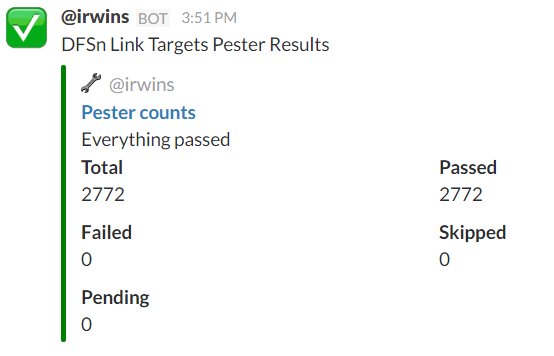‘Sup PSHomies,
So here is the follow up on the previous blog.
I recreated the shares, check! Now it’s time to create the DFSn Links & targets!
Here’s the code to create the necessary links and targets:
| <# | |
| Author: I. Strachan | |
| Version: | |
| Version History: | |
| Purpose: Create DFS link with specified target | |
| #> | |
| [cmdletbinding()] | |
| Param( | |
| $csvFile = 'DFSnLinksTargets.csv' | |
| ) | |
| Import-Module DFSN -Verbose:$false | |
| #region Import | |
| $csvDFSTargets = Import-Csv -Path .\sources\csv\$($csvFile) -Delimiter "`t" -Encoding UTF8 | |
| $DfsFolders = Get-DfsnRoot | ForEach-Object {Get-DfsnFolder -Path "$($_.Path)\*"} | |
| #endregion | |
| #region Main | |
| foreach($dfs in $csvDFSTargets){ | |
| #Test if target exists first | |
| if(!(Test-Path -LiteralPath $dfs.Target)){ | |
| Write-Warning "Target $($dfs.Target) doesn't exists" | |
| Write-Verbose "Creating target $($dfs.Target)" | |
| New-Item -Path $dfs.Target -ItemType Directory -Force | |
| if(!($DfsFolders.Path -contains $($dfs.link))){ | |
| Write-Verbose "Creating $($dfs.link) with target $($dfs.Target)" | |
| New-DfsnFolder -Path $dfs.Link -TargetPath $Dfs.Target | |
| } | |
| } | |
| Else{ | |
| Write-Warning "Folder '$($dfs.Target)' already exists" | |
| #Check if the DFS Target already exists | |
| $CheckDFSTarget = Get-DfsnFolderTarget -Path $dfs.Link | |
| if($CheckDFSTarget.TargetPath -eq $dfs.Target){ | |
| Write-Warning "DFSn Target is already set to $($dfs.Target)" | |
| } | |
| else{ | |
| Write-Verbose "Setting $($dfs.link) with target $($dfs.Target)" | |
| Set-DfsnFolderTarget -Path $dfs.Link -TargetPath $dfs.Target | |
| } | |
| } | |
| } | |
| #endregion |
Quick run down. The csv is straight forward Link, Target (tab delimited). I created a few checkpoints (again, better safe than sorry).First, I get a list of all actual DFS links & targets for reference. If the target doesn’t exist create it. That’s where the SMB share preparation came in 😉 If the link doesn’t exist create it. If the target exist, verify that it’s set to the specified link.
In my case I only have 1:1 Dfs link/target relationships. So this worked for me. Be sure to test this before trying it out in production.
I needed to recreate 1386 DFS links. This took a few minutes. 10 failed, not bad considering the amount. Now the old Irwin would have panicked at the sight of something going wrong (Whooosahhh). I kept it together and let script ride out. Once it was done I did my OVF to see which ones failed 😉
| <# | |
| Author: I. Strachan | |
| Version: | |
| Version History: | |
| Purpose: OVF DFS links & targets | |
| #> | |
| Param( | |
| $csvFile = 'DFSnLinksTargets.csv' | |
| ) | |
| Import-Module DFSN -Verbose:$false | |
| #region Import CSV and saved Credentials | |
| $csvDFSnTargets = Import-Csv -Path .\sources\csv\$($csvFile) -Delimiter "`t" -Encoding UTF8 | |
| $DfsnLinkTargets = Get-DfsnRoot | | |
| ForEach-Object{ | |
| Get-DfsnFolder -Path "$($_.Path)\*" | | |
| Get-DfsnFolderTarget | | |
| Select-Object Path,TargetPath | |
| } | |
| #endregion | |
| $lookupDFSn = $DfsnLinkTargets | Group-Object -AsHashTable -AsString -Property Path | |
| #region Main | |
| $csvDFSnTargets | | |
| ForEach-Object{ | |
| Describe "DFSn Link & Target Operation validation share $($_.Link)" -Tags 'DFSnLinkTargets' { | |
| Context "Verifying DFS Link $($_.Link)" { | |
| It "DFS Link $($_.Link) exists" { | |
| $lookupDFSn.$($_.Link).Path | Should be $_.Link | |
| } | |
| It "DFS Target $($_.Target) exists" { | |
| $lookupDFSn.$($_.Link).TargetPath | Should be $_.Target | |
| } | |
| } | |
| } | |
| } | |
| #endregion |
This is one of those rare instances that I created the missing links by hand (don’t judge me I was on a tight schedule). Turns out a few had some form of a special character in the name. Creating them by hand didn’t raise an issue.
Last but not least I wanted to generate a ReportUnit HTML of the DFSn test results. Generating the ReportUnit HTML file didn’t go as I expected. It did succeed in the end., but generating a HTML report for 2772 was a bit too much. Having said that…
There’s a module for Formatting Pester result using PScribo created by Erwan Quélin. Definitely check it out if you want to do everything in PowerShell (Who doesn’t? :-P)
Usage is pretty easy:

Here’s a quick screenshot of Format-Pester output:

Nice!
Once I resolved the failed test, I ran the test again, nothing but purple and green!
A quick notification in Slack using PSSlack by @pscookiemonster (Even though I’m the only one using Slack at the moment, give it time…)

Awesome!
So I learned that the size of the test when using ReportUnit.exe could be an issue, but if you want to do everything in PowerShell then Format-Pester is a better fit.
Hope it’s worth something to you
Ttyl,
Urv

Pingback: Get DSA object creation date | pshirwin
Just FYI on your slack comment… I created a slack room focused on Powershell for my local area and I am always in the powershell.slack.com room.
Really like your posts, will be adding to my Feedly stream!
LikeLiked by 1 person
Glad to hear it!
LikeLiked by 1 person